Diplomatic Bluebook 2021
Chapter 2
Japan's Foreign Policy by Region
2 Regional Situations in Europe
(1) The European Union (EU)
The EU is a political and economic union consisting of 27 member states with a total population of about 446 million. Sharing fundamental values and principles, the EU is an important partner for Japan in addressing global issues.
<Recent Developments of the EU>
The new EU leadership began in December 2019, including the inauguration of President of the European Council Michel and President of the European Commission von der Leyen. Response to COVID-19 and Brexit were the top priorities for the new EU leadership. In 2020, the European economy was majorly impacted by the unprecedented crisis of the global outbreak of COVID-19. In March, COVID-19 spread rapidly in Europe, beginning from Italy. It was pointed out that the EU's initial response was slow, which called into question the unity of Europe as a whole. Borders within the EU were revived as member states closed their own borders, which impeded freedom of movement, a cornerstone of the EU, and caused confusion and damage to the market within the EU.
The EU set forth a variety of measures and countermeasures including economic support since mid-March. In April, the EU announced that it would support non-EU countries and lead international support events as part of its international cooperation in response to COVID-19. A schedule for Europe's economic recovery was announced, and discussions on the creation of a recovery instrument began. In May, the European Commission proposed the recovery plan for Europe totaling 1.85 trillion euro comprising NextGenerationEU (the so-called recovery instrument) (750 billion euro) and the next Multiannual Financial Framework (EU budget for 2021-2027) (about 1.1 trillion euro). On July 21, the European Council agreed to a package of 1.824 trillion euro, consisting of the recovery instrument (750 billion euro) and the next EU budget (1.074 trillion euro), demonstrating the unity of Europe. In November, a political agreement was reached with the European Parliament on the recovery plan for Europe package. However, Hungary and Poland indicated that they would refuse to approve it because of its conditionality on the “rule of law,” a fundamental principle of the EU, and discussions and negotiations continued. A compromise agreement was reached with the European Parliament on December 11. The recovery instrument and the budget for the next period were approved respectively in the European Parliament on December 16 and in the European Council on December 17.
In addition, in response to moves by member states to revive their internal borders, the EU issued guidelines in March on strengthening border measures with the rest of the world, emphasizing cooperation within the Schengen Area, although the member states have authority over their border control. In accordance with the guidelines, member states began to impose restrictions on entry from outside the region. The restrictions were started in March and extended until the end of June, and then relaxed in July for some countries, including Japan, in accordance with the recommendation that the restrictions should be eased in a gradual and coordinated manner.
On the economic front, the Eurozone economy in 2020 suffered a severe shock in the first half of the year. Although it recovered strongly in the third quarter due to the gradual easing of containment measures, the resurgence of COVID-19 led to a slowdown in economic activity.
<Brexit>
At the end of January, the UK left the EU. In February, a transition period began in which EU laws continued to apply to the UK after its exit from the EU. In March, negotiations began on future relations, including a trade agreement between the EU and the UK. In order to minimize the negative impact of Brexit on Japanese companies operating in the UK and EU member states, the Government of Japan encouraged both the EU and the UK to conclude negotiations within the transition period. The negotiations were concluded on December 24, just before the end of 2020, which was the deadline for the transition period. Following the procedures in both the EU and the UK, the provisional application of the EU-UK Trade and Cooperation Agreement began on January 1, 2021. The UK Parliament completed its procedures by the end of 2020, and the agreement is expected to enter into force with the approval of the European Parliament in the first half of 2021.
<Japan-EU Relations>
Japan and the EU are strengthening their cooperation under the Japan-EU EPA, which entered into force in February 2019, and the Japan-EU SPA, of which provisional application started at the same time. The impact of COVID-19 made it difficult to hold in-person meetings. However, during the Japan-EU Leaders Video Teleconference Meeting in May, there was an exchange of views centered on COVID-19 countermeasures, including economic measures for recovery. It was confirmed to promote cooperation based on fundamental principles and shared values, and to strengthen cooperation in order to contribute to the resolution of regional issues including North Korea, the East China Sea and the South China Sea. Following his inauguration, Prime Minister Suga held Japan-EU Leaders' telephone calls with President Michel of the European Council in September and with President von der Leyen of the European Commission in October. In addition, Foreign Minister Motegi held a Japan-EU foreign ministers' telephone call with High Representative of the EU for Foreign Affairs and Security Policy Josep Borrell in November, in which they shared the views on the importance of cooperation between Japan and the EU for realizing FOIP. Furthermore, Foreign Minister Motegi became the first Japanese Foreign Minister to attend virtually the EU Foreign Affairs Council, which was held in January 2021. During the meeting, he explained Japan's views and initiatives for FOIP. In response, many EU member states expressed their understanding and support for the importance of a rules-based international order in the Indo-Pacific, and Japan and the EU shared the view to further promote cooperation in areas such as connectivity and maritime security.
On the economic front, economic ties between Japan and the EU have become even stronger with the legal basis of the Japan-EU EPA, which entered into force in February 2019. In order to ensure the steady implementation of the Agreement, the Japan-EU EPA Joint Committee as well as the specialized committees and working groups covering 12 fields established under the EPA have been reviewing the implementation status of the Agreement and discussing future initiatives to further promote trade between Japan and the EU. As COVID-19 spread in 2020, the second meetings of the specialized committees and working groups established under the Agreement were held in turn virtually. At each meeting, the status of implementation of each item stipulated in the EU-Japan EPA and matters of mutual interest between Japan and the EU were confirmed, and future initiatives and cooperative systems between Japan and the EU were discussed. Going forward, Japan will continue to further develop Japan-EU economic relations by ensuring the steady implementation of the Agreement and through other Japan-EU dialogue frameworks.
Furthermore, on June 22, Japan and the EU signed the Agreement on Civil Aviation Safety between the European Union and Japan. This agreement aims to reduce the burdens on the aviation industry and promote the free flow of civil aeronautical products by removing duplication in inspections and other procedures for the import and export of aircraft and other civil aeronautical products.
(2) United Kingdom
In the UK, so-called lockdown measures were introduced when COVID-19 began to spread in March. Infections began to slow down following that, but began to resurge since summer. In December, a new variant of COVID-19 emerged in the UK. At the beginning of the outbreak of COVID-19, the Johnson administration's approval rating temporarily increased, but it subsequently declined due to the increase in the number of deaths in the UK and the growing criticism over the administration's measures. On the other hand, Mr. Jeremy Corbyn, the opposition Labour Party's leader, resigned following the party's defeat in the general election at the end of 2019, and a new leader, Mr. Keir Starmer, took office in April. Mr. Starmer, who is considered to be centrist, harshly criticized the Johnson administration's COVID-19 response, and the Labour Party's approval rating rose to almost equal with that of the Conservative Party.
Brexit has been one of the biggest issues in the UK-EU relationship since the UK's June 2016 referendum on leaving the EU. Following parliamentary approval on both sides for the Withdrawal Agreement between the UK and the EU, the UK left the EU on January 31, 2020. Negotiations on the EU-UK Trade and Cooperation Agreement after Brexit began in March and were concluded on December 24. The bill to implement the draft Withdrawal Agreement was passed by both houses of UK Parliament on December 30. The Withdrawal Agreement was provisionally applied from January 2021, thus avoiding a situation of tariffs being established between the UK and the EU following the end of the transition period at the end of December.
As for Japan-UK relations, the UK has been strengthening its involvement in the Indo-Pacific region. Even as COVID-19 spreads, dialogue and exchanges have continued at various levels between Japan and the UK, including at the summit level and the foreign minister level, and bilateral relations have been strengthened. Prime Minister Abe held summit telephone calls with Prime Minister Johnson in March and September, in which they exchanged views regarding matters such as COVID-19 countermeasures. Prime Minister Suga also held a summit telephone call with Prime Minister Johnson in September, during which Prime Minister Johnson congratulated Prime Minister Suga on his appointment. The leaders confirmed that they would cooperate to further develop bilateral relations, including strengthening cooperation in the security field toward the realization of FOIP. They also agreed to cooperate toward the Olympic and Paralympic Games Tokyo 2020.
Foreign Minister Motegi held the Eighth Japan-UK Foreign Ministers' Strategic Dialogue with Secretary of State for Foreign and Commonwealth Affairs Dominic Raab, who visited Japan in February, and confirmed the strengthening of bilateral cooperation in light of Brexit. In August, Foreign Minister Motegi visited the UK on his first overseas visit since the spread of COVID-19. He held a foreign ministers' meeting with Foreign Secretary Raab and negotiated the Japan-UK Comprehensive Economic Partnership Agreement with Secretary of State for International Trade Elizabeth Truss. After an agreement in principle was reached in September and being signed in October, the Agreement entered into force on January 1, 2021 (see the Special Feature on page 180).
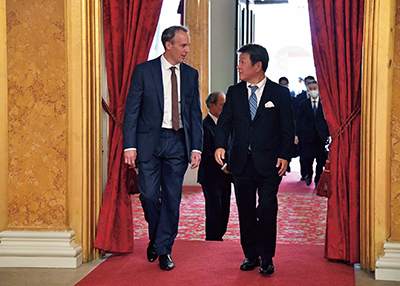 Japan-UK Foreign Ministers' Meeting (August 5, London, UK)
Japan-UK Foreign Ministers' Meeting (August 5, London, UK)With regard to culture, taking into account the effects of COVID-19, various events took place in Japan and the UK as part of the “Japan-UK Season of Culture,” the period which bridges the two major sports events of the Rugby World Cup 2019 and the Olympic and Paralympic Games Tokyo 2020 (see the Column on page 126).
Japan and the UK have a history of exchange spanning more than 400 years, since the English sea captain and pilot, William Adams (Miura Anjin), first drifted to present-day Oita Prefecture on a Dutch ship in 1600.
Japan-UK relations are important in a wide variety of fields including politics and economy, but cultural exchange is indispensable for strengthening the bonds between the people of the two countries. In August 2017, then-Prime Minister Abe and then-Prime Minister Theresa May agreed to hold “the Japan-UK Season of Culture” as an event that bridged the Rugby World Cup 2019 and the Olympic and Paralympic Games Tokyo 2020. Under this initiative, the “Japan Season of Culture in the UK” showcases the multi-faceted appeal of modern Japan from its culture and art to innovation and cutting-edge technology in areas such as medicine, science and industry. Building on ongoing grassroots exchanges and local community activities, various events have been held to strengthen the ties between the citizens of the two countries in the long term.
A large-scale exhibition project held under this program is the “Manga” exhibition held at the British Museum from May to August in 2019. This exhibition drew about 180,000 visitors and recorded the largest number of visitors per day among the special exhibitions put up by the British Museum in 2019. The exhibition projects of 2020 were significantly impacted by the novel coronavirus disease (COVID-19) pandemic. One of these projects, the “Kimono: Kyoto to Catwalk” exhibition held at the Victoria and Albert Museum (V&A) in London in February, shifted to an online exhibition and seminar when it was temporarily suspended due to the pandemic. After the on-site exhibition resumed, it remained so popular that booking slots were filled every day until it closed in October.
Many people from the UK visited Japan during the Rugby World Cup 2019. Following that, the “Rugby and the Olympics Special Exhibition” was held from November 2019 to August 2020 at the World Rugby Museum in London, further contributing to Japan-UK exchanges. In addition, a cooperation project has begun in which private Japanese organizations will donate more than 5,000 cherry trees all over the UK, as a symbol of friendship between the two countries.
 Performance by the Tomioka Dance Club in “Japan Matsuri Presents 2020” (September, online event, Photo: Tomioka Dance Club)
Performance by the Tomioka Dance Club in “Japan Matsuri Presents 2020” (September, online event, Photo: Tomioka Dance Club)The “Japan Matsuri Presents 2020” project held online in September drew the participation of about 50 groups and organizations from both Japan and the UK and featured Japanese culture and topics from many different facets, succeeding as a new online initiative. For example, the Tomioka Dance Club from Osaka Prefectural Tomioka High School harnessed new ideas and communication tools to present new dances, expressing how Japanese high school students strive hard toward their goals despite the circumstances of the COVID-19 pandemic. Japan House London also organized a wide variety of online events, including seminars covering topics such as Japan-UK relations and the COVID-19 response by the two countries, and Japanese language speech contest for junior and senior high school students. Japan-related online events are involving the remote participation of many organizations, including universities and research organizations, making it possible for people to experience exchanges while remaining in their own homes.
 Japanese cuisine demonstration in “Japan Matsuri Presents 2020” (September, online event, Photo: Japan Matsuri)
Japanese cuisine demonstration in “Japan Matsuri Presents 2020” (September, online event, Photo: Japan Matsuri)The “Japan Season of Culture in the UK” has been extended till the end of 2021 since many events were postponed due to the COVID-19 pandemic. While it is unfortunate that various events have had to be postponed in 2020 due to the unexpected spread of COVID-19, various exchanges are still taking place mainly through online platforms. Despite the COVID-19 pandemic, such continued exchanges made possible through the zeal of people from both Japan and the UK reflect the strong ties between the two countries that have lasted for more than 400 years.
(3) France
Since he took office in May 2017, President Macron has promoted various reforms such as reform of labor laws, and he has achieved success in improving France's competitiveness and restoring public finances. On the other hand, the government's decision on the fuel tax increase in November 2018 brought about large-scale demonstrations known as the “yellow vests movement.” In response to these demonstrations, President Macron implemented the “grand débat” to have direct dialogue himself with citizens throughout France, which resulted in improving his approval rating. However, in December 2019, large-scale strikes over the pension system reform proposal caused his approval rating to drop again. Amidst this situation, COVID-19 began to spread in France in February and March. President Macron made a televised speech explaining the restriction measures and calling for national unity. Due to this response, President Macron's approval rating rose again. In July, President Macron nominated Mr. Jean Castex, who had been in charge of easing restrictions related to the COVID-19 measures, as the new Prime Minister. In October, terrorist attacks occurred in France over caricatures of the Prophet Mohammed of Islam and other issues, making countermeasures against terrorism and extremism an urgent issue. With respect to external affairs, France continues to have a stance of placing importance on multilateralism. In response to the COVID-19 crisis, President Macron called for European unity and demonstrated his leadership by spearheading the establishment of the EU recovery instrument with Germany.
As for Japan-France bilateral relations, Prime Minister Abe held a summit telephone call with President Macron in March and confirmed that they would cooperate on responding to COVID-19. In May and June, Foreign Minister Motegi held telephone calls with Minister for Europe and Foreign Affairs Jean-Yves Le Drian and confirmed that Japan and France would cooperate on responding to COVID-19 and in the international arena, and advance Japan-France cooperation in the Indo-Pacific. In October, Foreign Minister Motegi visited France and held a foreign ministers' meeting with Minister Le Drian. They confirmed the promotion of bilateral cooperation in responding to COVID-19 and in the Indo-Pacific, and the continued close cooperation on regional issues surrounding the East China Sea, the South China Sea and North Korea. In the same month, Prime Minister Suga held a summit telephone call with President Macron, in which President Macron congratulated Prime Minister Suga on his appointment. They confirmed that, as “Indo-Pacific nations,” Japan and France will cooperate to further develop bilateral relations, including strengthening cooperation to realize a free and open Indo-Pacific. They also confirmed cooperation toward the Olympic and Paralympic Games Tokyo 2020.
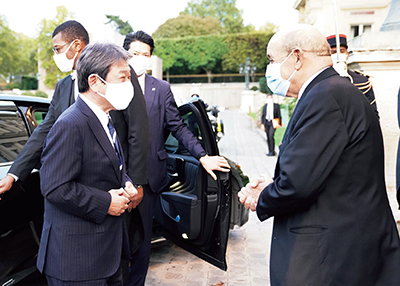 Japan-France Foreign Ministers' Meeting
Japan-France Foreign Ministers' Meeting(October 1, Paris, France)
(4) Germany
Before the spread of COVID-19, the approval rating for the federal grand coalition consisting of the Christian Democratic Union and Christian Social Union (CDU/CSU) and the Social Democratic Party (SPD) had been declining due to dissatisfaction with its refugee policy and other issues, repeated defeats in state elections, and the resignation of the leader of the CDU, whom Chancellor Merkel had nominated as her successor. However, Chancellor Merkel took necessary measures at a relatively early stage in response to the spread of COVID-19, and the number of new infections and deaths was kept at a lower level than in neighboring countries in Europe. In addition, in her first televised address to the nation in her 15-year tenure, Chancellor Merkel demonstrated leadership by calling for national unity, saying that the COVID-19 crisis was the greatest challenge for Germany since World War II. This caused the approval ratings for Chancellor Merkel and the CDU to rise significantly.
On July 1, Germany assumed the EU Presidency and played a leading role in Europe's response to the spread of COVID-19, including by contributing to the passage of the recovery plan for Europe in coordination with France.
In September, the Government of Germany indicated its intention to strengthen its engagement in the Indo-Pacific region by approving its Policy Guidelines for the Indo-Pacific, which emphasize the importance of freedom of navigation, the rule of law, and connectivity in the region, stating that “more than anywhere else, the shape of tomorrow's international order will be decided in the Indo-Pacific”
With regard to Japan-Germany bilateral relations, despite restrictions on international travel due to the spread of COVID-19, high-level exchanges continued, including two summit meetings and two foreign ministers' meetings held either as teleconference meetings or telephone calls. During the Japan-Germany Leaders Video Teleconference Meeting in July, in addition to exchanging views on cooperation on COVID-19 countermeasures, the two leaders agreed to cooperate to revitalize Japan-Germany relations toward the 160th Anniversary of Japan-Germany Friendship of the following year. During the Japan-Germany summit telephone call in September, Chancellor Merkel congratulated Prime Minister Suga on his inauguration, and the two leaders confirmed that they would closely cooperate on matters including realizing FOIP. During the Japan-Germany Foreign Ministers' Video Teleconference Meeting held in October following their telephone call in March, Foreign Minister Motegi praised the Policy Guidelines for the Indo-Pacific formulated by Germany, and the two ministers agreed to strengthen bilateral cooperation for the realization of FOIP.
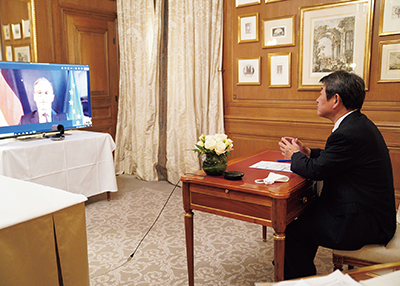 Japan-Germany Foreign Ministers' Video Teleconference Meeting (October 1, France)
Japan-Germany Foreign Ministers' Video Teleconference Meeting (October 1, France)(5) Italy
Although the Five Star Movement and the Democratic Party formed an alliance and the second Conte Cabinet was inaugurated in August 2019, Prime Minister Giuseppe Conte needed to strike a balance between the ruling coalition parties, which have different political opinions. In addition, Minister of Foreign Affairs and International Cooperation Luigi Di Maio resigned as the leader of the Five Star Movement following the party's crushing defeat in local elections and internal problems. Although the constitutional amendment to reduce the size of the Italian Parliament promoted by the Five Star Movement was approved by a majority in a referendum in September, the party's approval rating declined. In January 2021, Italia Viva, one of the ruling coalition parties, withdrew from the government due to the conflict between the ruling coalition parties over the use of the European Stability Mechanism (ESM) in the healthcare field and the management of the European recovery instrument. In response, the Chamber of Deputies and Senate of the Republic held a vote of confidence for the Conte administration, and both votes were approved. On the other hand, as a result of the failure to secure an absolute majority in the Senate of the Republic, Prime Minister Conte announced his resignation. President Sergio Mattarella called on all the political parties to give confidence to a non-party cabinet to deal with the emergency situation, and former European Central Bank President Mario Draghi was inaugurated as Prime Minister in February 2021.
The initial spread of COVID-19 within Europe began in Italy, where two Chinese tourists were confirmed as the first positive cases at the end of January. The government declared a state of emergency on January 30. Infections spread to northern Italy at the end of February, and a nationwide lockdown was implemented in March. Due to his leadership in the health and hygiene crisis, Prime Minister Conte's approval rating remained in the 60% range. Various ordinances since March have announced large-scale economic measures centered on sectors affected by COVID-19. However, in the second wave after November, the approval rating for Prime Minister Conte's administration declined as he lost the support of people who were economically disadvantaged by the restrictive measures.
As for Japan-Italy relations, in March, Foreign Minister Motegi held a telephone call with Minister of Foreign Affairs and International Cooperation Di Maio. The ministers explained the efforts being made by Japan and Italy in relation to COVID-19 and confirmed that both countries would discuss and cooperate on COVID-19 countermeasures in the international arena, including the G7 Foreign Ministers' Meeting. In October, Prime Minister Suga held a summit telephone call with Prime Minister Conte. They shared the view to closely cooperate on various issues facing the international community, including the response to COVID-19 at the G20, for which Italy assumed the Presidency in 2021. They also confirmed the cooperation to realize FOIP.
(6) Spain
In January, the second term administration of Prime Minister Pedro Sánchez was inaugurated, becoming the first coalition government since the democratization of Spain. A state of alarm was declared in response to the spread of COVID-19 in Spain beginning in early March. The minority ruling coalition government managed to extend the state of alarm and have economic and social relief measures approved in the Congress, gaining cooperation of other parties. It has maintained a certain level of support by the public after the spread of COVID-19.
In regard to Japan-Spain relations, Foreign Minister Motegi held a foreign ministers' telephone call with Minister of Foreign Affairs, European Union and Cooperation Arancha González Laya in May, and Prime Minister Abe held a summit telephone call with Prime Minister Sánchez in June. Japan and Spain shared the view to continue to cooperate on COVID-19 countermeasures, and to further deepen their strategic partnership and cooperate toward further developing bilateral relations, including further strengthening Japan-Spain economic relations, promoting cooperation toward realizing FOIP, and expanding people-to-people exchanges when exchanges could be restarted.
The year 2020 marks the 100th anniversary of relations between Japan and the Czech Republic as well as the Slovak Republic.
Looking back to 1918, a century ago, the Austria-Hungary dual monarchy was dissolved following the end of World War I, and Czech and Slovak nations, which had been under the control of this empire, formed a joint state. This was how Czechoslovakia was founded. In October 1919, Foreign Minister of Czechoslovakia Edvard Beneš sent a letter to Foreign Minister of Japan Uchida Kosai, requesting for Japan's agreement on the dispatch of the first envoy extraordinary to Japan in order to establish diplomatic relations with Japan. In January 1920, Japan decided to accept the request and diplomatic relations were established.
Czechoslovakia went through a turbulent history after that, before achieving democracy in the Velvet Revolution of 1989 and peaceful separation and independence as the Czech Republic and the Slovak Republic in 1993. Japan established diplomatic relations once again with the two countries respectively.
In marking the 100th anniversary of relations with the two countries that have overcome many difficulties, the global spread of the novel coronavirus disease (COVID-19) has unfortunately placed severe restrictions on the opportunities for Japan to commemorate the anniversary with the two countries. For example, it has become impossible to realize anticipated high-level mutual visits, and many cultural events have had to be suspended. Despite such circumstances, the relevant personnel have implemented commemorative projects as far as possible while assessing the situation of infections and putting the necessary measures in place.
In the Czech Republic, “Nagomi-Kyogenkai Czech,” a traditional Japanese theater performance (kyogen) group under the Shigeyama Sengoro family of kyogen actors, held a performance in September that was cosponsored by the Senate of the Parliament of the Czech Republic and the Embassy of Japan in the Czech Republic. This kyogen group has given more than 800 public performances since its establishment in 2000. In spite of the serious pandemic situation, strong support from the Senate helped to realize an outdoor live performance with a small audience as well as a live streaming of the performance. The performance was attended by representatives of the Senate and Government of the Czech Republic, including President of the Senate Miloš Vystrčil and Foreign Minister Tomáš Petříček, as well as recipients of Japanese decorations, while the livestream drew as many as 5,000 viewers. Hence, the performance was an excellent opportunity for creating a strong impression of the friendly relations between the two countries. In addition, other projects that allow people to celebrate the anniversary from their homes were also held on the dedicated website. These included a photo contest and interviews of people who have made significant contributions to the development of relations with Japan over many years.
In Slovakia, a project to plant cherry trees, a symbol of Japan, in various parts of the country was held in cooperation with many involved parties, with the hope that the friendly relations between the two countries will last for a long time into the future. Eventually, in consideration of the COVID-19 situation at the local sites and other factors, approximately 450 cherry trees were planted in various parts of Slovakia. Among these, the commemorative ceremony held in October at the Museum of Slovak National Uprising (SNP), located in the Banská Bystrica Region of central Slovakia, was attended by Minister of Foreign and European Affairs Ivan Korčok, and served as a valuable opportunity for further promoting friendly relations between Japan and Slovakia, as well as further revitalizing mutual exchanges.
Despite the impact that the COVID-19 pandemic had on the anniversary and the difficult situation faced by the two countries, it was still a year of strong affirmation that Japan and the two countries are important partners that share fundamental values. Taking the opportunity of this anniversary year, Japan will continue to deepen exchanges in various areas to realize further development of the long friendly ties between the two countries.

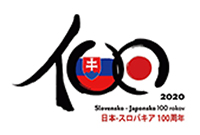 100th anniversary commemorative logo for the two countries
100th anniversary commemorative logo for the two countries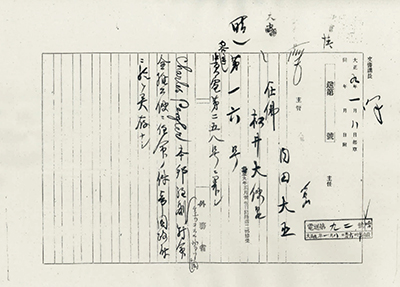 Official telegram approving the dispatch of the first envoy extraordinary of Czechoslovakia to Japan, Karel Pergler (collection of the Diplomatic Archives of the Ministry of Foreign Affairs of Japan)
Official telegram approving the dispatch of the first envoy extraordinary of Czechoslovakia to Japan, Karel Pergler (collection of the Diplomatic Archives of the Ministry of Foreign Affairs of Japan)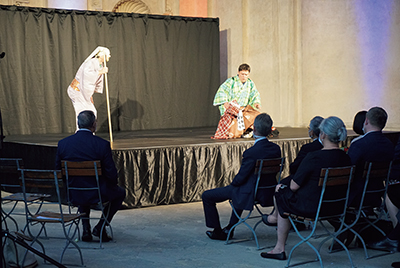 Kyogen performance at the Senate of the Czech Republic
Kyogen performance at the Senate of the Czech Republic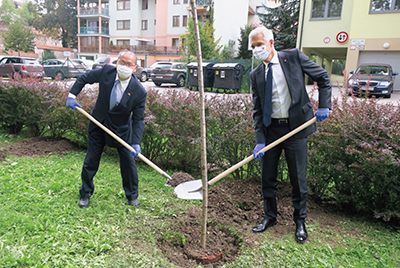 Tree-planting by Ambassador of Japan to the Slovak Republic, Nakagawa Makoto, and Minister of Foreign and European Affairs of the Slovak Republic, Ivan Korčok
Tree-planting by Ambassador of Japan to the Slovak Republic, Nakagawa Makoto, and Minister of Foreign and European Affairs of the Slovak Republic, Ivan Korčok

